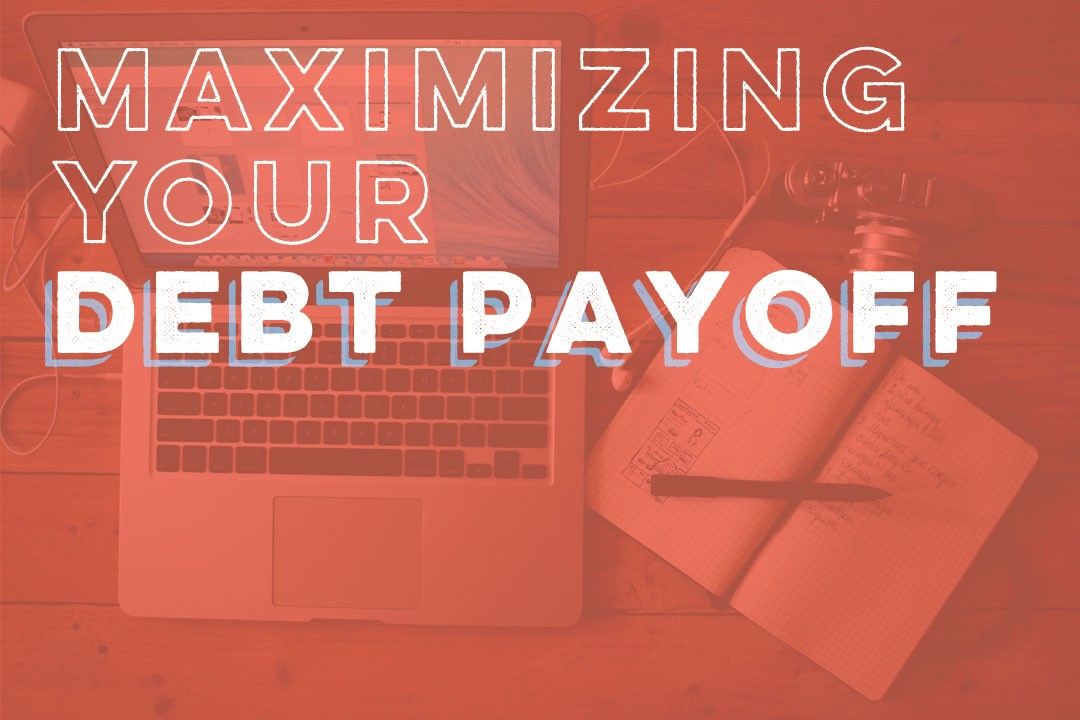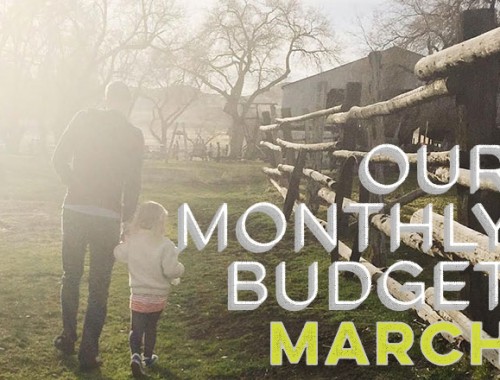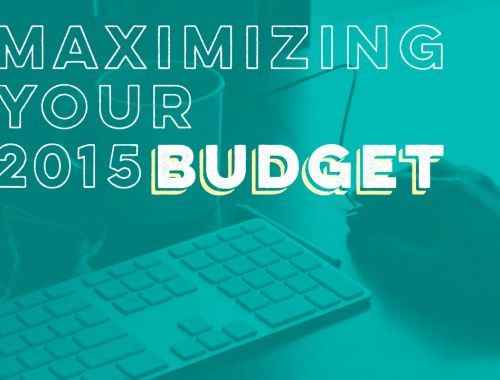Johnny and I started our debt payoff process at the beginning of the year, as many of you might be doing this year. The debt payoff process was daunting, exciting, sucky, rewarding, hard, overwhelming, and empowering. It brought out all kinds of crazy emotions. While we were paying down our loans, there was never a time when either of us wanted to quit. We both really wanted to be debt free as soon as possible, and that never, ever changed. What we both struggled with, though, were those day-to-day spending decisions that felt small but that could have potentially ruined our plan if we’d let them.
Ultimately, the success of paying off our debt depended on our ability to stick to our monthly budget. So here are our essential tips for having a successful budget while maximizing debt payoff:
Start backwards budgeting.
We recently did a post on backwards budgeting and why we’re all about it. This is how it works… before you set your monthly budget, first decide how much debt you’d like to pay off each month. Then create a budget that works for your debt payoff. If you can’t make a budget work for that number, ask yourself if you can make more money to make that debt payoff work. And ask this question seriously, not as a “Maybe I could…” when you really never would. If you still can’t make that debt payoff amount work, you may need to adjust it some, but the point is to make your budget work for your financial goals as much as possible. This year, Johnny and I really want to save 50% of our net income. Currently, our budget only allows for 25% savings. So we’re planning to make enough side income to make up for the rest. It won’t be easy, but it’s doable if we stick to it.
Set reasonable expectations.
While maximizing your monthly debt payments is extremely important, it’s just as important to set up a plan that’s realistic.This sounds like a contradiction to backwards budgeting, but I promise it isn’t. It’s just a reminder. Setting a super extreme budget that you can’t actually live with long term will just cause failure in the long run. You’ll get burnt out and defeated, and your debt will just sit there, collecting interest. That said, you should push yourself to pay down as much as is reasonably possible. Living a luxurious lifestyle while paying down debt shouldn’t go hand in hand. Money should feel tight. A good rule of thumb in making your budget is to ask yourself what you can reasonably give up over the next few years, and give it up. Yes, years. Sure, we could all live off rice and beans for a month, but it’s not something we’d be willing to stick to for years.
Be prepared to fail.
Even if you set up the perfect budget and debt payoff plan, you will overspend at some point during the process. Or maybe a huge expense will come up that you weren’t expecting. It might even be the very first month. That’s okay. The key is to be consistently trying. When we moved to New York City mid-debt-payoff in 2010, we lowered our debt payments significantly for a few months until we were settled, which messed up our plan for a bit. But then we got back on track and kept on truckin’. Consistent effort, not perfection, is the key to having success.
Have a long-term plan.
While it’s important to figure out how much debt you can feasibly pay down each month, you should also make a plan that sees your debt payoff to the very end. You should be able to answer these kinds of questions: When will your debt be eliminated? How much debt will you have paid off six months from now? You get the idea. Because your day-to-day spending will be your biggest hurdle in paying off your debt each month, you’ve got to be able to have a big-picture perspective to combat that. Johnny and I typed out our plan, printed it off, and hung it up in our office so we could see the visual each month. Seeing the big picture down on paper helped keep us going.
Start a debt snowball.
When we paid down our loans, we used the debt snowball method, and we highly recommend it. The two most common methods are the debt snowball and the avalanche method. The debt snowball method attacks smallest debts first, and the avalanche method attacks largest loans. We loved the little psychological victories that came from paying off our smaller loans first, as they really helped contribute to our motivation to keep on keepin’ on. If you’d like to know more about the debt snowball method, you can read this post where we wrote all about how to start one.
Have a monthly pow wow with your S.O.
If you’re paying off debt with someone else, communication is a major key to success. You both have to be on the same page each and every month. Your spending needs to be transparent. If one or both of you is slipping, you’ve got to regroup. That’s what the monthly pow wow is for. At the end of each month, assess how you did. Talk about how you could do better. And then plan for the month ahead. This will be especially important in the beginning, until you adjust to your budget.
And so ends our first “maximizing your budget” session. Each person’s debt payoff plan is going to be different. If you have any specific questions we didn’t touch on, feel free to shoot us an email or throw out a comment and we’ll do our best to answer them. Any other tips you’d add to this list? Let’s hear ’em!





33 Comments
I love the idea of backwards budgeting! Paying yourself first works wonders. Also, one thing I’ve found helpful for myself is to have a month’s “slush” extra in a savings/checking account separate from my main savings and my main checking. The reason is, in case I fail to meet my expected spending, rather than drawing from my main savings the extra money (thus “opening the floodgates”, if you will) I have a designated “overdraft” for myself which I have to restore ASAP but will help me regain balance if I fall a little behind on savings goals.
Perfect reminder! Having an emergency fund (even if it’s small) is a must when you’re paying down debt. Thanks for the great tip!
I love that you’re posting more frequently! You always have a good perspective, and it definitely motivates me to keep chugging along. I paid $1500 on my student loans this month, and I think some of the motivation behind it came from you two! Thank you so much!!! I’m even considering getting a second job for more payments – you’re inspiring. And Sally – those cheeks. Can’t get over them.
Way to go! Talk about starting 2015 off right! We feel pretty fortunate that the Google gods have brought a bunch of like-minded people to our site so we can all help motivate each other. Comments like yours are what motivate Johnny and me!
Ah …the timing of this post is perfect! I just did my last payment on my first (smallest) loan using the snowball method after setting up everything back in Septmeber! (Thanks to you guys!!) and as you said before, once you click “transfer” it is pretty anticlimactic! but I am quite happy be done with it, and ready to tackle on the next!! 😀
Thanks guys for all your help! I am quite lucky to have found your very-informative-yet-hilarious blog!!!
Happy belated birthday to Sally!
Awesome. We loved the debt snowball method… glad it is working for you! It sounds like 2015 will be a very good year. And thank you for reading… comments like these are what keep us going!
I love the debt snowball method! Before, I was trying to make extra payments on one of my biggest loans and it just seemed like nothing was even happening, but now making extra payments to my smaller loans has definitely been more rewarding. The interest rates are comparable, so why not feel those victories?!
So glad to hear you’ve found a method that’s working for you! Here’s to many victories in 2015!
This was a good post for today. We recently paid off both our cars and my student loans, but now my husband is back in school and we are racking up student loan debt once again. He will be in school for a few more years, and we’ve been paying monthly interest on unsubsidized loans, but I think it’s time to start tackling the principal too! Thanks for the reminder that it’s exciting to pay off debt!!
Way to go on paying off your cars and student loans. While going into more student debt isn’t fun, it sounds like it’s worth it. And with your attitude, you guys will have it all paid off in no time!
Being prepared to fail was the hardest part for me. I just wanted to attack it like crazy, so even the slightest setback was rough. Fortunately that didn’t happen much. We also set huge expectations at first and then soon realized, “Oh yeah, we probably do need to budget for clothes and haircuts over the next year.” It’s amazing what you think you can live without when you’re on a budgeting high. Haha! “Undies? Don’t need them. TP, we can just use less…” I was seriously delusional. =)
Ha, I like the way you describe it… a budgeting high. So true. Our expectations were out of control when we started our first budget. And then reality set in, and we realized we didn’t like eating pb&j’s for dinner every night. Finding the right balance is key to having success.
This post is great timing to keep my motivation going. In 2014 my husband and I payed off about 25k in debt so we’ve got another 25k this year to go, which I’m anticipating the final payment to be around August. Our debts were 2 car loans and student loans so we switched between using the snowball and avalanche method based on loan type. First we went after the low balance student loans to keep the motivation strong and then we paid off the cars since interest on SLs reduces your taxable income and car loan doesn’t.
Very smart to switch based on the loan type. And way to go on paying off $25k last year! It sounds like 2015 is going to be a great year for you guys. Well done!
Backwards budgeting is a great idea. It’s really forward-thinking because you’re saying where you want your money to go, not just where it currently goes. This gets you thinking outside the box on ways to save (or increase income). We do a yearly budget with extra house payments, giving, and saving/investing planned for as well as typical expenses.
Yes, that’s a great way to look at backwards budgeting…. looking at your money outside the box we normally put it into.
All good points that you make, Joanna, and I’ve used them all over the years – although maybe not as often as you guys (due to your past student loans, etc.). My wife and I tried like hell to stay out of debt as much as possible right from the git-go, when we first got married. One of the ways that we accomplished this was to avoid having to pay interest, whenever possible – meaning that we tried to save ahead for things (egs., cars, furniture, etc.) rather than take out loans. One thing that we did was, rather than paying down past debt, instead we put money aside in our budget towards “future debt”.
For example, let’s say that you drive a car right now and you expect that in “x” years from now you will need “y” dollars to go out and buy a new car to replace it. With that in mind you set up a monthly budget savings item (let’s call it “future car fund”) where you decide on the amount that you will need to save each month to eventually meet this goal “x” years from now. Of course, where you save this money is important as well since you want each dollar saved to be working as hard as possible to earn “safe” investment interest income, thereby providing that extra assurance of saving for that future car.
Great reminder. It’s always smart to try anticipate upcoming expenses!
“Consistent effort, not perfection, is the key to having success.”
I couldn’t agree with this more! While my little family of 4 is not currently in debt (woo! woo!) we are living off of my teacher salary while my husband goes to school. We aren’t taking out any student loans so living by a budget is key to graduating debt free!
Way to go on avoiding debt and making your budget work for you! You guys are doing great!!
All great tips! I’m $1,800 away from being debt free ($28,000 paid off in 25 months – woo hoo!) and I think I owe it largely to this sort of mindset. I’d been working away at my debt and making no progress for years until I put these tips into practice. One thing I would add, which I think goes along with “Set reasonable expectations”, is to build small treats into your budget. Nothing big – I got really good at turning down invitations to events that didn’t fit in my budget – but I found that a little treat once in a while helped keep me going. Without them, I was way more likely more likely to get frustrated, then cave and spend way too much money.
Thanks for all the great advice. Love your blog and am looking forward to reading about your future adventures!
Yes! Such a great tip, Becky! Even on our tight budget, Johnny and I were each allotted $20/month to spend as we pleased, which was key to sticking to our debt payoff plan. Thanks so much for bringing this up. And well done on paying off almost all of your debt — and in such a short amount of time. You are so close!!
I agree with you–keeping the lines of communication open with your partner is paramount! My husband and I talk about our finances on a regular basis and I’ve found that the more we talk about it, the more invested we both feel in our overall goals. Being on the same financial page has really helped us to simplify our lives and to feel more content with what we have.
Totally agree. Knowing we’re both on the same page has made budgeting so much easier and more enjoyable!
Thanks for more great tips! I often look back over your old posts as to how far you’ve come so that it inspires me and drives me to keep going! Keep up the fantastic work! Hi to little miss cuteness sally 🙂
Thanks, Suzanne! Honestly, when we were paying down our loans, it felt like we would never be doing anything but that for the rest of our lives. Thanks for your kind words!
Great Tips! I really love the idea. Thank you for sharing all of these. It gave me so much motivation.
Keeping the motivation is a big goal for me this year. One way I plan on keeping it up is reading some finance or money saving tip(gardening my own food for ex.) every day to keep my spirits up. I love how down to earth and optimistic you two are.
Great idea! Johnny and I want to work on that, too… starting each day keeping a big-picture perspective. Here’s to a successful 2015!
These are great tips. People need to take them seriously. They might sound cliche but only because they work!
We practice backwards budgeting too. (The same principle can be applied to time and priorities as well.) Combining BB with a hybrid debt snowball, zero-sum budget, and some side hustle action helped us to become debt-free.
Awesome. Sounds like you guys have found a few systems that are working great for you!
Ooh I really like the idea of backwards budgeting! That way, you really prioritize your debt repayment.
Attention Esteemed Customer.
Thanks for your response to our financial offer, Note we offer loans at 2% and we give out minimum and maximum loan of $3,000USD to $10,000,000USD Interested applicant should fill the application and get back to us via email bobbbritten1432@gmail.com for further procedures and more info. As soon as the applicant form is filled the Loan terms and repayment plan will be sent to you and all other informations.
Our Services Include the Following:-
*Investors Loans……….
*Debt Consolidation………..
*Second Mortgage……………
*Business Loans………….
*Personal Loans……………
*International Loans………..
Loan Applications Form
Full Names:
Gender:
Marital status:
Contact Address:
Country: State:
Age:
Monthly Income:
Loan Amount:
Duration of Loan:
Occupation:
Purpose for Loan:
Contact Phone Number:
Awaiting to do business with you.
Mr BOB Britten